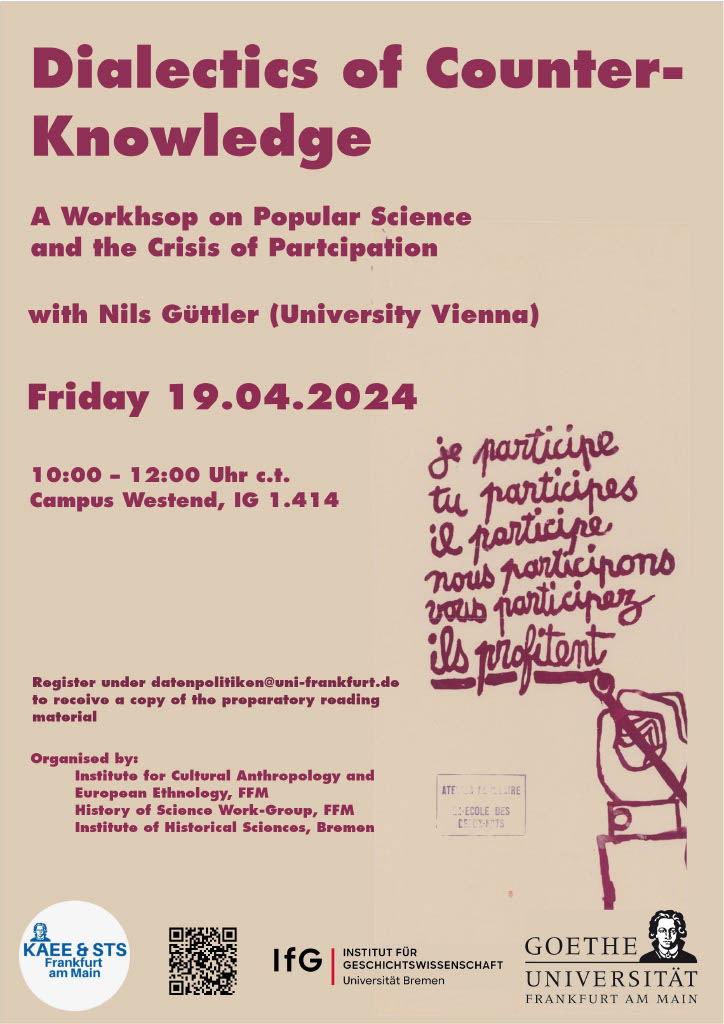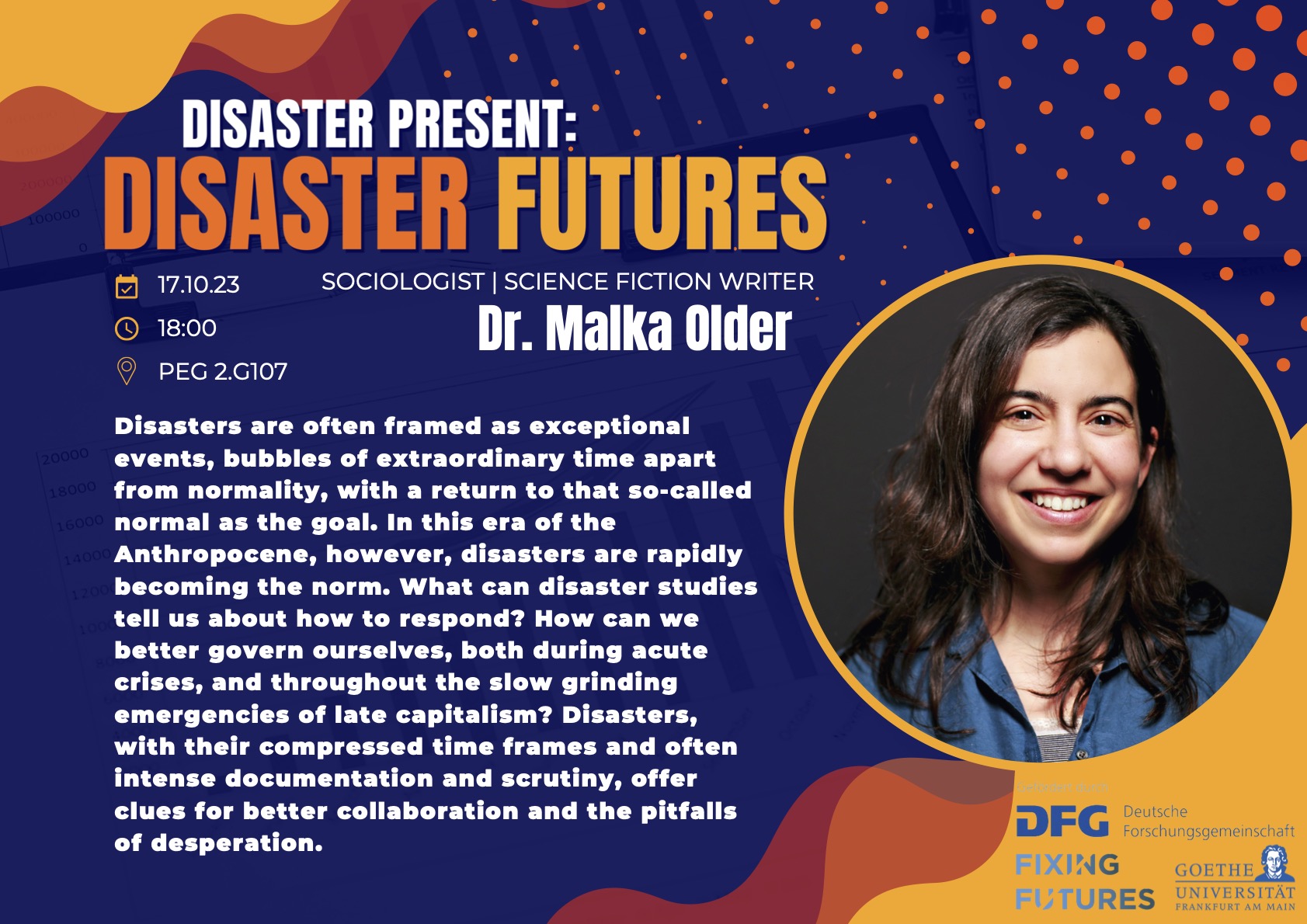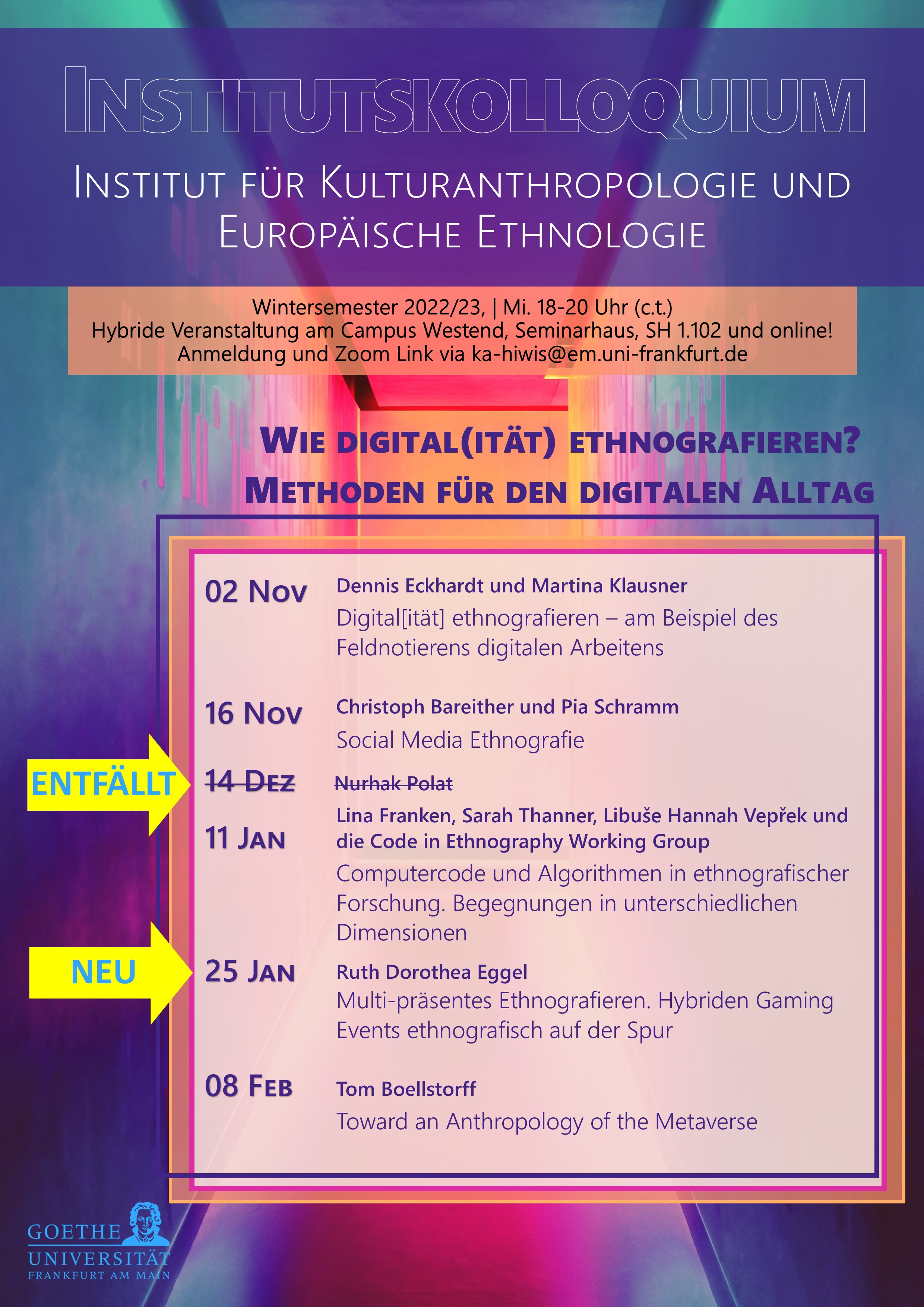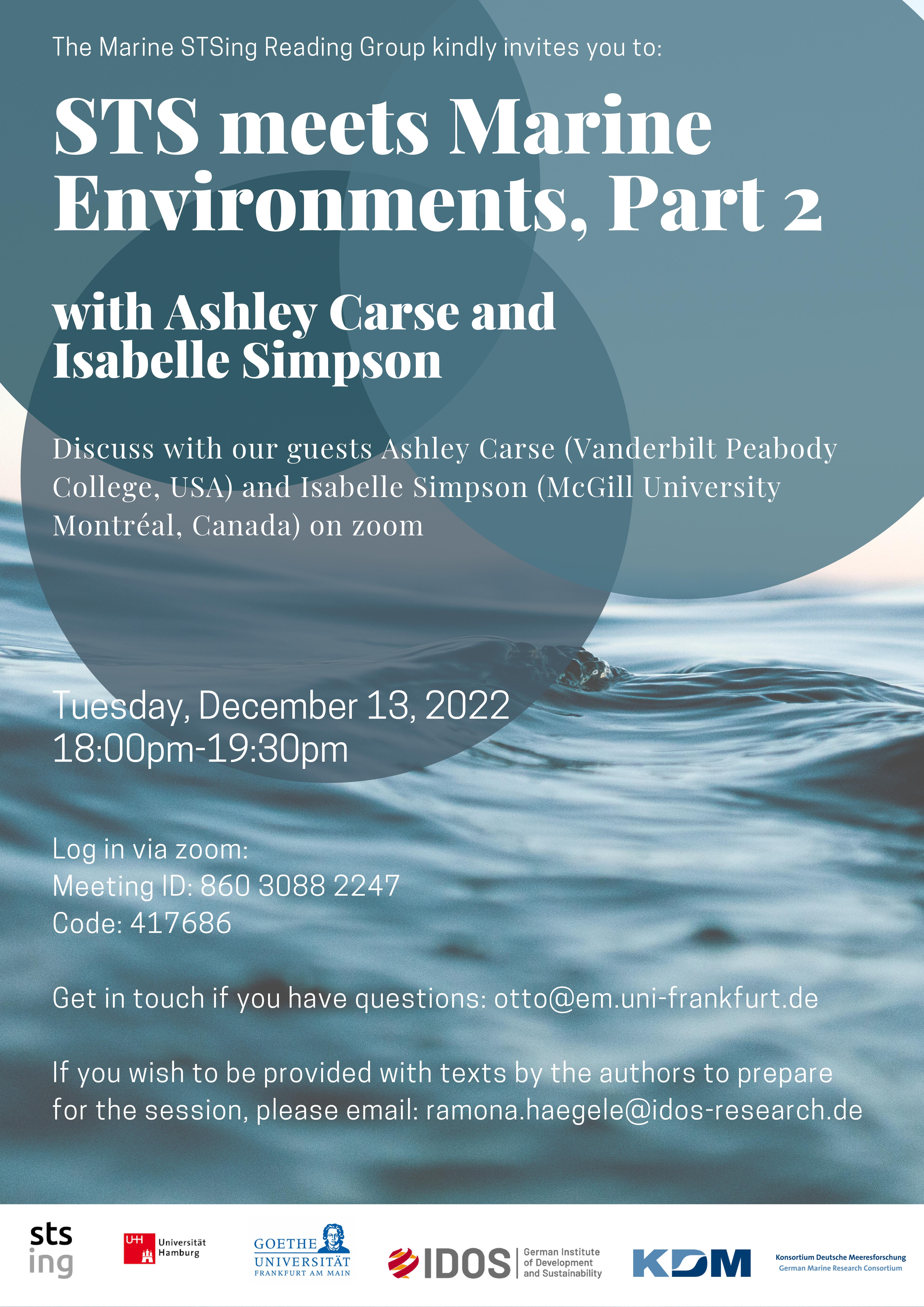Events
2024
19.04.2024, 10:00 – 12:00 Uhr c.t. - Campus Westend, IG 1.414
Between the 1960s and 1990s, various forms of “alternative" knowledge entered the political sphere, challenging established relationships between science, expertise and politics. Social movements – most prominently the environmental, feminist, queer, peace and “Third World" movements – called for new forms of knowledge production and circulation that were closer to “the people". The term widely used was “Gegenwissen": “counter-knowledge" or “radical science" produced in opposition to the perceived hegemony of the military-industrial complex. By enhancing the authority of lay expertise and advocating for a democratization of knowledge production, social movements reinterpreted one of the fundamental principles of democracy – participation – as an “epistemic virtue".
However, in the face of conspiracy theories and science denialism, counter knowledge has lost much of its original glamor. What is the state of "alternative knowledge" today and how can a historical perspective help us to change the view on the ruptures within our current knowledge culture – both, in academia and beyond?
The workshop is a cooperation of the Institute for Cultural Anthropology and the History of Science work group at Goethe University Frankfurt in collaboration with the Institute for Historical Sciences at the University of Bremen. It is organised by Martin Herrnstadt, Timotheus Kartmann, Janine Hagemeister and Catharina Dietrich.
A text to prepare the discussion will be provided after registration for the event at datenpolitiken@uni-frankfurt.de
To take part online via zoom, please ask fo the link also at this adress!

2023

07.02.2024, 18:00-20:00 | SH 4.104
Lindsay Poirier (Smith College, USA), Infrastructuring Collaborative Hermeneutics: Databasing Double Bind while Pursuing PECE. In this talk, I will narrate the tensions of designing the Platform for Experimental Collaborative Ethnography (PECE) - a software distribution for supporting multi-sited and multi-perspectival ethnographic research. In particular, I will discuss the architectural challenges to designing data storage systems, interfaces, and workflows that foster collaborative analysis while leaving ethnographic data open to productive reinterpretation. NOTE: The colloquium organisers are going to host a workshop with Lindsay Poirier around her talk, to learn more about PECE from her perspective and practically engage with the functions and options of PECE. Check out our website for updates on this workshop. (To participate online, please send an email to our student assistant Sarah-Lisa Beck: Sa.Beck@em.uni-frankfurt.de We will then send you the link shortly before the event.)
17.01.2024, 14:00-16:00 | SH 4.104
Magdalena Buchczyk (Humboldt-Universität zu Berlin), Tangled Threads of Heritage and Care in Southern Europe.
By integrating critical heritage studies, and environmental anthropology, the paper aims to challenge the foundational frameworks of safeguarding cultural and natural heritage. Drawing on research conducted with weavers in Sardinia, the talk explores how heritage vitality serves as a lens through which we examine various approaches to caretaking and environmental justice.
20.12.2023, 14:00-16:00 | SH 3.105
Franziska Mucha (Historisches Museum Frankfurt), Museum knowledge digital - from open access to socio-affective spaces. The digitization and publication of museum collections is accompanied by the promise of enabling 'open access' to these otherwise inaccessible collections of knowledge. In reality, however, access does not necessarily mean use. The POEM research project shows which socio-affective spaces are needed for critical negotiation and creative re-use of museum knowledge.
6.12.2023, 16:00-18:00 | SH 4.104
Işıl Seçil Yıldırım (Institute for Cultural Anthropology and European Ethnology, University of Frankfurt), "Nobody remains unchanged." In conversation with urban lab workers. An individual and collaborative confrontation with Nazi history. An increasingly diverse society demands a socially inclusive public memory that is shaped by all sections of the population. This approach was the starting point for the remembrance work on Nazi history as part of the Stadtlabor at the Historisches Museum. Part of the inclusive remembrance work is also the participation of people with a history of migration. What does this work mean for social actors who come together as part of the project and talk about their family history? Some of them talk about specific experiences in Frankfurt during the Nazi era, while others have only recently arrived in Frankfurt as refugees or migrants and have had nothing to do with the Nazi era.
22.11.2023, 14:00-16:00 | SH 3.105Judith Blume (Collections of Goethe University / University Library, University of Frankfurt), Matthias Harbeck (FID Social and Cultural Anthropology / University Library, Humboldt-Universität zu Berlin), Ingmar Lippert (Institute for Cultural Anthropology and European Ethnology, University of Frankfurt), Ich sehe was, was Du nicht siehst: Wissenspolitik digitaler Infrastrukturen.(I see something you don't see: the knowledge policy of digital infrastructures.), How do digital and digitizing infrastructures make knowledge visible or invisible, what is known through them, what is not, and with what consequences? We will discuss these questions using three cases: a wild museum between industry and autochthonous people in Germany, the presentation of collections and objects in various portals and databases of the Frankfurt University Collections and the examination of the digitization of "difficult" materials (including those from colonial contexts) in the Specialized Information Service for Social and Cultural Anthropology. What visions of digital infrastructures can be developed from these three examples?
8.11.2023, 18:00-20:00 | Braubachstraße 7
Timotheus Kartmann (Institute for Cultural Anthropology and European Ethnology, University of Frankfurt), Tobias Krauch (German Architecture Museum and Agency for Urban Change): From social museum Frankfurt to urban real laboratory? Guest at the Agency of Urban Change (Braubachstraße 7), Until National Socialism, the Social Museum Frankfurt (ca. 1902 - ca. 1934) was probably the most important socio-political collection in the German language. According to social historian Janet Horne, social museums can be described as "laboratories of modernity". At present, the concept of the (real) laboratory is becoming increasingly important in urban transformation processes. What can be learned from the historical example of Frankfurt's social museum today, in the context of pressing socio-political issues and with a view to the democratic co-design of urban coexistence and its transformation? Together with Tobias Krauch from the DAM Reallabor team, we want to examine the experimental field of the inner city in the agency of urban change from a cultural anthropological perspective in terms of potentials and difficulties and explore the question of how collectively effective, well-founded urban knowledge is produced and can be incorporated into planning and political contexts?2023
You are kindly invited to attend a public lecture on disasters, offered by Dr. Malka Older from Arizona State University on Tuesday, 17. October, 6 pm (ct) in room PEG 2G.107.
Malka Older is a writer, aid worker, and sociologist. After working in international assistance and disaster response for more than a decade, she completed her doctorate in the sociology of organizations at Sciences Po. Her academic writing focusses primarily on disaster response, temporality, and geopolitics. Her science-fiction political thriller Infomocracy was named one of the best books of 2016 by Kirkus, Book Riot, and the Washington Post, while her latest book, The Mimicking of Known Successes, was a most anticipated pick for Today.com, Buzzfeed, Polygon, Book Riot, and Ms. Magazine.
The lecture will address disaster presents and disaster futures, focussing on how disasters, with their compressed time frames and often intense documentation and scrutiny, offer clues for better collaboration and the pitfalls of desperation. No registration is required. We are looking forward to your numerous attendance.

2022

- Studying at Goethe University
- International applicants
- Faculties
- Overview of study programmes
- Programme for refugees
- GRADE
- Goethe Business School (continuing education)
- Research at Goethe University
- Scientific news
- Goethe Welcome Center (for international researchers)
- Collaborative research projects
- Individual research
- Visiting fellowships
- Endowed chairs
- About the University
- News-in-brief
- University administration
- Campus locations
- Campus life
- University archives (German)
- Rhine-Main-Universities







